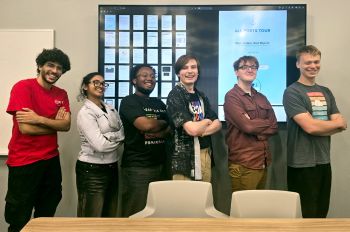Dawson Collaborates with South Pacific Nations on Cybersecurity, AI Issues
![Maurice Dawson [left] talking to constituent in Fiji](/sites/default/files/styles/width_1280/public/2024-05/dawson_fiji01_1280x850.jpg?itok=jfOFNsxw)
Maurice Dawson, associate professor of information technology and management at Illinois Institute of Technology, was recently an invited guest of the United States Agency for International Development in Fiji to share his cybersecurity and artificial intelligence expertise.
Dawson spoke with government officials, students, and the media to address the unique cybersecurity needs that Fiji faces, in addition to USAID’s interests in the South Pacific.
“Many sectors of Fiji are concerned with cybersecurity for many reasons,” Dawson says. “The country has yet to adopt a high-level cybersecurity directive that will flow down to all levels of government, which includes giving businesses direction on how they should secure their networks.”
Dawson says that a new underground fiber optic cable is being laid in the Pacific, making the network more robust. There also is a rapid digitization that is occurring that has many Fijian officials uneasy. For example, government officials have identified online safety as a primary concern in order to curb inappropriate content that is being viewed by minors that is suggestive or has caused negative behavior not ordinary seen in Fijian society.
Dawson provided his insight to help strengthen the country’s digital economy and to highlight new threats that need to be considered, including the emergence of AI and quantum computing.
He also spoke with journalism students at University of South Pacific about the risks and uses of AI. He discussed how AI tools can be used by journalists to help them, as well as how AI can be used to develop misinformation and fake news, and how to detect fake news.
The discussions included experts and officials from across the South Pacific, including those from Samoa, Australia, and New Zealand. Discussions revolved around issues that directly affect the needs of the region. Issues related to a resilient South Pacific include developing safe and secure communications, building infrastructure to help people access information, and establishing cybersecurity arrangements that enable business, education, and digital connectivity for South Pacific populations.
Dawson says the trip has resulted in a new research opportunity, which will begin this fall with a graduate student.
“This project will investigate how cybersecurity policies in the Pacific, particularly Fiji, translate into practical implementation,” Dawson says. “We will engage with USAID to address real mission needs, mapping policy directives to low-level strategies for effective cyber defense.”
Dawson says he was also able learn about the history of Fiji and how the island nation became so diverse during his visit. He says that by interacting with Fijians, Samoans, and other Pacific Islanders, he can better understand their desires for their respective communities.
He was also intrigued by the conversations that he had with young people and their interest in leaving Fiji to pursue their careers in Australia or New Zealand due to rising prices and weakened wages.
“This discussion resembled the same that I had with youth in Kosovo,” Dawson says. “This just shows that the youth in developing countries are willing to leave their home countries to pursue greater opportunities.”
Photo: Maurice Dawson [left]




